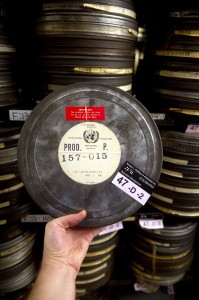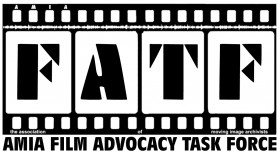 The General Assembly of the International Federation of Film Archives (FIAF) has recently voted, by a large majority, to support the efforts being made by Cinematographer Guillermo Navarro and Artist Tacita Dean to have Film (both Still and Motion Picture) accorded UNESCO World Heritage status.
The General Assembly of the International Federation of Film Archives (FIAF) has recently voted, by a large majority, to support the efforts being made by Cinematographer Guillermo Navarro and Artist Tacita Dean to have Film (both Still and Motion Picture) accorded UNESCO World Heritage status.
Renowned in their respective fields, Navarro and Dean have been working over the last number of years to protect the medium of Film in the face of increasing proliferation of electronic imaging and projection technologies. Together with a number of eminent colleagues, they are promoting awareness of the unique character of Film and its critical role in cultural diversity and freedom of artistic expression, past, present, and future.
Over the past century, film has changed humankind. From the earliest fragments of captured movement, it has allowed us to see ourselves, document ourselves and invent ourselves using just the mechanics of light, lenses and chemistry. Film and photography are our cultural and historical memory. They hold in their emulsion the imprint of time: how we have lived, worked and created in communities across the world, for as a means of depiction, film belonged to everyone. It was our universal language, and despite a century divided by conflict, everyone could still gather together to share the imagery and emotion created by film.
Now, with the invention of the digital process, the medium of film as an irreplaceable artistic language is gravely threatened and will, unless action is taken, simply disappear.
We cannot allow this to happen. Film is too wondrous and unique an invention to be forfeited for the sake of short-term economic gain. Just as one would not think of simply scanning a medieval manuscript before dispensing with the original, or hanging a postcard in a museum in lieu of a prized oil painting, film has its own particular inherent beauty and is not simply replaceable as a medium by digital technology. Its obsolescence will result in irretrievable losses in all that we may no longer be able to see and experience, and in what we will no longer be able to make, because we will have forfeited the technology and knowledge to do so.
…
Many in the cinema industry and in the art, museum and archive communities are reaching the consensus that such cultural irresponsibility and short-sightedness cannot be allowed to take place in what is seen as a critical moment in film’s survival. We are therefore coming together as a body to petition UNESCO to protect the medium of film as a World Heritage so that future generations will be able to experience film as we have done.
(Extract from Statement issued by Guillermo Navarro, Tacita Dean and a number of eminent Colleagues in London in February 2012. Full text available from the website of IMAGO, the European Federation of Cinematographers)
The United Nations Educational, Scientific and Cultural Organization (UNESCO) has among its core purposes the fostering of Freedom of Expression and Protection of Heritage in accordance with the United Nations Universal Declaration of Human Rights 1948.
UNESCO – Fostering Freedom of Expression
UNESCO – Protecting our Heritage and Fostering Creativity
UNESCO World Day for Audiovisual Heritage
UN Photo / Ryan Brown
